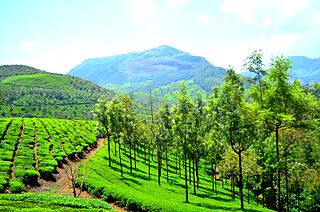
Munnar is a town and hill station located in the Idukki district of the southwestern Indian state of Kerala. Munnar is situated at around 1,600 metres (5,200 ft) above mean sea level, in the Western Ghats mountain range. Munnar is also called the "Kashmir of South India" and is a popular honeymoon destination.

Idukki is one of the 14 districts in the Indian state of Kerala in the southwest of the country. It is the largest district in Kerala and lies amid the Cardamom Hills of Western Ghats in Kerala. Idukki district contains two municipal towns - Kattappana and Thodupuzha, and five taluks.
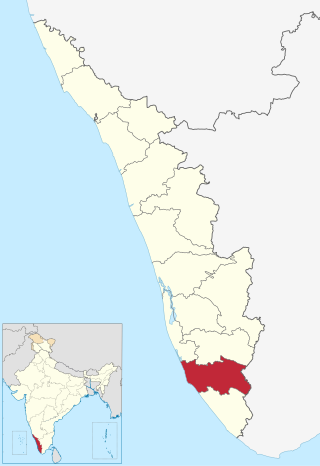
Kollam district, is one of 14 districts of the state of Kerala, India. The district has a cross-section of Kerala's natural attributes; it is endowed with a long coastline, a major Laccadive Sea seaport and an inland lake. The district has many water bodies. Kallada River is one among them, and land on the east bank of the river is East Kallada and that on the west bank is West Kallada.

Elephants found in Kerala, the Indian elephants, are one of three recognized subspecies of the Asian elephant. Since 1986, Asian elephants have been listed as endangered by IUCN as the population has declined by at least 50% over the last three generations, estimated to be 25,600 to 32,750 in the wild. The species is pre-eminently threatened by habitat loss, degradation and fragmentation. Along with a large population of wild elephants, Kerala has more than seven hundred captive elephants. Most of them are owned by temples and individuals. They are used for religious ceremonies in and around the temples, and some churches, and a few elephants work at timber yards.

Eravikulam National Park is a 97 km2 national park located along the Western Ghats in the Idukki and Ernakulam districts of Kerala in India. The park is situated between 10º05'N and 10º20' north, and 77º0' and 77º10' east and is the first national park in Kerala. It was established in 1978.

Pathanamthitta, is a municipality situated in the Southern Kerala, India, spread over an area of 23.50 km2. It is the administrative capital of Pathanamthitta district. The town has a population of 37,538. The Hindu pilgrim centre Sabarimala is situated in the Pathanamthitta district; as the main transport hub to Sabarimala, the town is known as the 'Pilgrim Capital of Kerala'. Pathanamthitta District, the thirteenth revenue district of the State of Kerala, was formed with effect from 1 November 1982, with headquarters at Pathanamthitta. Forest covers more than half of the total area of the District. Pathanamthitta District ranks the 7th in area in the State. The district has its borders with Allepey, Kottayam, Kollam and Idukki districts of Kerala and Tamil Nadu. Nearest city Is Thiruvalla, located at a distance of 30 km. Thiruvalla railway station Is 30 km via Thiruvalla-Kumbazha highway. Buses ply every 5 Minutes from Thiruvalla To Pathanamthitta & vice versa.
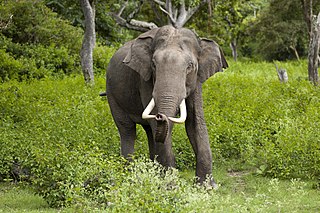
The Indian elephant is one of three extant recognised subspecies of the Asian elephant and native to mainland Asia.
Kochi is a major port city in the Indian state of Kerala. The city is widely known as the commercial or economic capital of the state of Kerala.

Konni, also spelt Konny, is a town and taluk headquarters in Pathanamthitta district of Kerala, India. Konni is known for its elephant cages, forests, and rubber plantations. It is also known as "Aanakoodinte Nadu". Nearest town is Pathanamthitta. Konni is located 32 km (20 mi) from Chengannur railway station and NH 183 in Chengannur. It is well-connected via Muvattupuzha - Punalur state highway. Buses ply frequently from Pathanamthitta KSRTC bus station to Konni.

Ghat Roads are access routes into the mountainous Western and Eastern Ghats, mountain ranges of the Indian subcontinent. These roads are remarkable feats of engineering, and most were constructed during the British Raj. Ghat Roads were built to connect to the hill stations established in the mountains for residents to avoid summer heat. They generally served to connect coastal areas with the upper Deccan Plateau.

Kerala State Road Transport Corporation is a state-owned road transport corporation in the Indian state of Kerala. It is one of the country's oldest state-run public bus transport services. The corporation is divided into three zones, and its headquarters is in the state capital Thiruvananthapuram. Daily scheduled service has increased from 1,200,000 kilometres (750,000 mi) to 1,422,546 kilometres (883,929 mi), using 6,241 buses on 6,389 routes. The corporation transports an average of 3.145 million commuters per day.

Kurinjimala Sanctuary protects the approximately 32 hectare core habitat of the endangered Neelakurinji plant in the Kottakamboor and Vattavada villages in Devikulam Taluk, in the Idukki district of Kerala, a state in southern India.
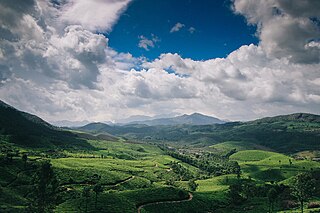
Suryanelli is a resort settlement in the Chinnakanal village in Idukki district, Kerala, India. Situated 40 km South East of the popular tourist location of Munnar. It is surrounded by tea plantations and many resorts.

Kollam KSRTC bus station is an important transport hub in the Indian city of Kollam, owned and operated by the Kerala State Road Transport Corporation (KSRTC) under the depot code KLM. The bus station is located in Taluk Cutchery and is close to Kerala State Water Transport Department's Kollam City water transport terminal. Long distance intrastate, inter-state and city buses run regularly from the bus station. The bus station comes under Kollam Zone of Kerala State Road Transport Corporation.

The KDHP Tea Museum is an industry and history museum situated in Munnar, a town in the Idukki district of Kerala in South India. Tata Tea Museum is its official name, but it's also known as Nullathanni Estate where it is located, or Kannan Devan Hills Plantation (KDHP) Tea Museum.

Edamalakkudy, or Idamalakkudy, is a remote tribal village and gram panchayat between the Idamalayar Reserve Forest and Mankulam Forest Division of the Anaimalai Hills in the Idukki district of the Indian state of Kerala.
Kilambakkam Bus Terminus, officially Kalaignar Centenary Bus Terminus, is a bus terminus in Kilambakkam, a southern suburb of Chennai, India. Situated along the GST Road, it caters to the bus services towards the Southern districts of Tamil Nadu. It became operational on 30 December 2023. Spread over an area of 88.52 acres (358,200 m2), it is built to decongest the Chennai Mofussil Bus Terminus in Koyambedu. It will chiefly handle buses to southern Tamil Nadu, including cities such as Dindigul, Kanyakumari, Madurai, Thoothukudi, Tiruchirappalli, Tirunelveli, Cuddalore, Pondicherry, Sengottai, Karaikudi, Kumbakonam, Thanjavur and to major cities in Kerala including Thiruvananthapuram, Ernakulam, Palakkad, Thrissur, Munnar and Guruvayoor. It is an integrated bus terminus of mofussil buses operated by TNSTC, SETC, Kerala KSRTC, KSRTC SWIFT and contractual (omni) buses. It will be connected to other parts of the Chennai Metropolitan Area and suburbs by MTC buses. It is Asia's biggest bus station.
Aluva KSRTC bus station is a transport hub in the Indian city of Aluva, owned and operated by the Kerala State Road Transport Corporation (KSRTC). An important transport hub in the state, the station is located left aside Aluva railway station, one of the busiest railway stations in the Ernakulam district, and a kilometre away from Aluva metro station of Kochi Metro.
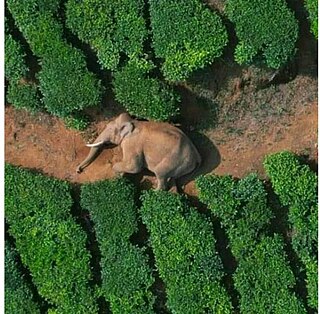
Arikomban is a wild male Indian elephant from Kerala, India. The elephant is known for his raids on local shops for rice and causing damage in Chinnakanal area of Munnar and is rumoured to have killed ten people and injured many. The name Arikomban is a combination of the Malayalam words ari, meaning rice, and komban, meaning tusker.
















